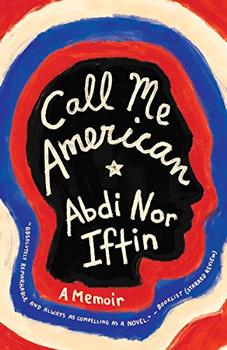Summary | Excerpt | Reviews | Beyond the Book | Readalikes | Genres & Themes | Author Bio

A Memoir
by Abdi Nor Iftin
I watched all day as the Marines took positions, more and more of them coming. Two men in uniform waved to let us cross the airport runway up to the sand dunes, so we could watch as the hovercrafts brought more and more Marines from the sea. Humvees and tanks roamed noisily but never fired a shot. I was getting impatient for the battle to start. We watched as the troops pulled out their stuck Humvees from the sand dunes. Hassan and I grew bolder and edged close to the troops. I stood there with my mouth open, watching them drink from a water bottle and smile at us. I made a sign asking for water, and the white guy in uniform went into the Humvee and handed me a plastic bottle. Then we made eating signs with our hands to our mouths, and they handed us tasty marmalade, bread and butter. The Commando lookalikes even spoke to us in Somali, but all they could say was "Somali Siko!" Somali move back!
One of the Marines threw a chocolate candy to me. I grabbed it and swallowed the whole thing. When I got home and told Mom, she gave me a hard slap.
"You must not eat pork!" she said.
I told her I didn't think it was pork, it was sweet, but she didn't believe me. How would she know what pork tastes like?
Night came again, and Mogadishu was noisier than I had ever heard it. But for the first time in two years, there was no sound of explosions and gunfire. We were surprised how the Marines lit up the airport. Lights came from everywhere, helicopters, tents, cars. It looked like daytime in the middle of the night. We were not allowed to get too close to the airport at night—"Somali Siko!" the Marines yelled over and over. But for the first time my friends, my brother and I could go out on the dusty streets after dark and play games, laugh and talk. We counted the helicopters as they flew over, and the big gunships that circled over the city. Falis's movie theater could now stay open at night, but we did not go. For the first time in years, outside was even more exciting than the movies.
* * *
The year had changed to 1993, my ninth year of life. The U.S. troops and the star-spangled banner were now accompanied by blue UN helmets and flags of countries from all over Asia, Africa and Europe. Many non-military people also came to the city to help. We would see them jogging, and swimming in the green waters off the beach. One woman, some kind of aid worker, jogged every morning near our house. She was white, had long hair, and she smiled and remembered my name. I made sure to get up every morning and say hi to her when she passed. I watched her listening to music on her headphones and stretching. Sometimes she would sit and play games with me, my brother and Nima. She always brought us snacks like peanuts, candies and cookies, and she also brought painkillers, antibiotics and other medicine. We had never seen pills, so she explained what they were for, and how to take them. I think I fell in love with this women, it wasn't romantic but I just wanted to stay close to her. If I knew her name today, maybe I could find her in America, but I only called her what we called all non-Muslims, gaalo or infidel. One day she came to the madrassa, just to visit and say hi. Macalin Basbaas refused to shake her hand. Then one day we stopped seeing her. Soon we realized no one was jogging anymore.
The warlords were getting restless, they wanted the city back. Aidid had a radio station and was telling Somalis on the air that they should fight the "occupation" of Mogadishu. On June 5, UN forces went to the radio station to seize weapons. Aidid thought they were trying to shut down the broadcasts and he ambushed the troops, killing twenty-four Pakistani soldiers. That's when things got bad. On July 12 the Americans sent Cobras over a house in Mogadishu where they thought Aidid was hiding and blasted it into rubble. He wasn't there, but dozens of other people were killed. Aidid claimed the Americans had killed women and children, and he started to whip up Somalis against the infidel "invaders." The Americans said only Aidid's soldiers had been in the house, but the seed of resentment against the foreigners had been planted. Aidid wasted no time, planting roadside bombs in August that killed four American soldiers and wounded seven others. The Battle of Mogadishu had begun.
Excerpted from Call Me Americanby Abdi Nor Iftin. Copyright © 2018 by Abdi Nor Iftin. All rights reserved. No part of this excerpt may be reproduced or reprinted without permission in writing from the publisher.
Your guide toexceptional books
BookBrowse seeks out and recommends the best in contemporary fiction and nonfiction—books that not only engage and entertain but also deepen our understanding of ourselves and the world around us.